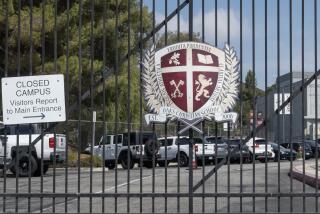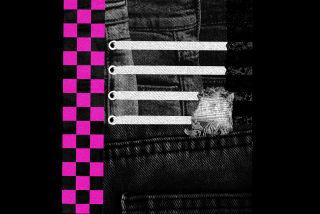Hitting a nerve on race, stereotypes
- Share via
One of the first calls Sundeep Bhatia received Monday was from the principal at Dorsey High, a few blocks from his South Los Angeles 7-Eleven store.
Bhatia is the store owner I wrote about Saturday after his 7-Eleven was hit by a group of rowdy kids last week on the Martin Luther King Jr. holiday. Bhatia was disgusted that the teenagers -- most of them black -- would act so disrespectfully on what he called a “sacred” day.
The teenagers were filmed by security cameras rushing through the store, stealing and knocking things off the shelves. The column prompted Dorsey Principal George Bartleson’s offer to come by and view the tape, though he seemed insulted by Bhatia’s suspicion that Dorsey students were involved. “I would be surprised,” Bartleson told me. “I’m not ready to jump to that conclusion.”
At nearby Crenshaw High, officials were more forthright. “Some of those looting students could have been Crenshaw students,” said dean Sherry Rickenbach. “I think it is a tragedy that some of our kids make irresponsible choices, mainly because they think that they are anonymous.”
Readers suggested the kids be publicly shamed -- the video posted online, shown in school assemblies and linked to our newspaper’s website. Bhatia said he’s willing to make it public if he can get permission from his corporate bosses.
“I’m sure someone would recognize a kid or two” if images from the video were posted at neighborhood schools and churches, a teacher from Pasadena said in an e-mail. “A few students who can’t sit down for a week (as I would have been, had I pulled a stunt like that as a teenager) would be a good start.
“But from my experience,” she wrote, “I can tell you what most of the parents of these teenagers would say: ‘Stop picking on my baby.’ ”
And a former high school principal suggested the young looters themselves might relish the notoriety. Students at her school used to swarm local clothing stores, she said, “and scoop up jackets, hats and anything else they can carry . . . then have the nerve to show up at school . . . wearing the items and purposely keeping the tags on so people would know they had participated.”
So much for putting the tape on YouTube and turning junior thieves into Internet celebrities.
--
Bhatia’s story touched a nerve with me and I felt compelled to share it, even though I knew the telling would stir up troubling discussions of race and class.
It’s hard to avoid that in a story like this, with its ready-made stereotypes -- hardworking immigrant shopkeeper versus young ghetto thugs -- clashing on a day we’re supposed to be celebrating racial equality and goodwill.
I figured it would unleash a torrent of e-mail. So I opened my in-box and braced myself.
Some readers, like Ron Erdrich, pointed out that rich white kids can be just as destructive and mean. “Apathy for society and vandalism knows no color,” he said, sharing an account of “bored, white suburban boys who somehow thought [it] would be fun” to set fire to their local middle school.
But then there were the e-mails like these, sent by cowards eager to make a point, but not bold enough to sign their names . . . sort of like those kids who rampaged through Bhatia’s store with their jacket hoods pulled over their faces:
“Don’t take it personally that a bunch of black kids robbed the 7-Eleven. They were just doing what comes naturally to y’all.”
“You can take them out of the jungle but . . .”
And from a reader who called himself Johnny Rocket: “I never wanna hear another black person complain that they are being targeted because they are black. THEY ARE BEING TARGETED BECAUSE THEY’RE BLACK, and justifiably so . . . Hopefully you folks will finally get it.”
Oh, I get it all right. Especially the “you folks” part.
--
An honest conversation about race is always tricky -- full of minefields and mixed messages.
We tend to talk in sweeping terms, about “us” and “them.” We make judgments about entire groups based on stereotypes and individual experiences. We measure the state of race relations by our own encounters.
That’s why Robert S. Rodgers of Culver City believes that countless black youths will pay the price for this isolated incident of lawlessness. “The good will suffer as well as the bad,” he wrote. “The owner and his family and friends can’t help but harbor negative thoughts about us African Americans.”
And why reader Raul Apino, “white and about 50,” might tell him that racism doesn’t exist. “For the last 30 years, virtually no one I speak to has uttered a racist comment. It’s just not there anymore,” he said.
Raul, I’d like to introduce you to Johnny Rocket.
--
More to Read
Sign up for Essential California
The most important California stories and recommendations in your inbox every morning.
You may occasionally receive promotional content from the Los Angeles Times.













